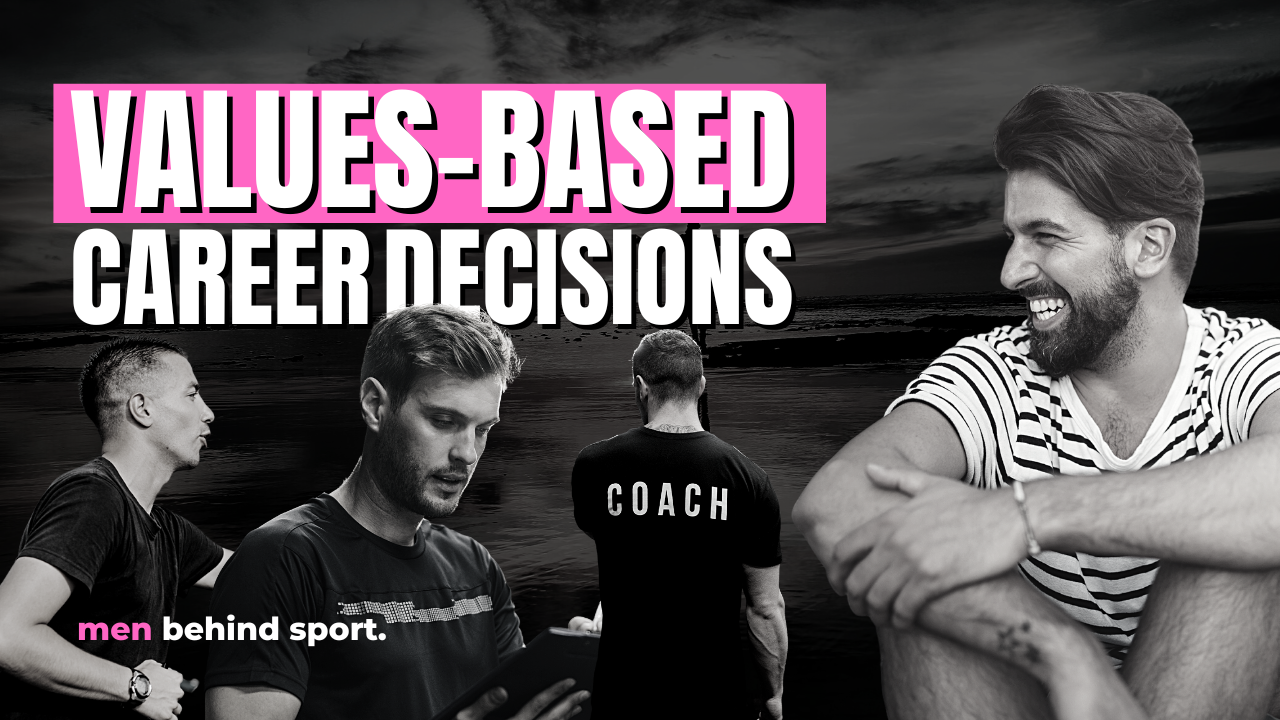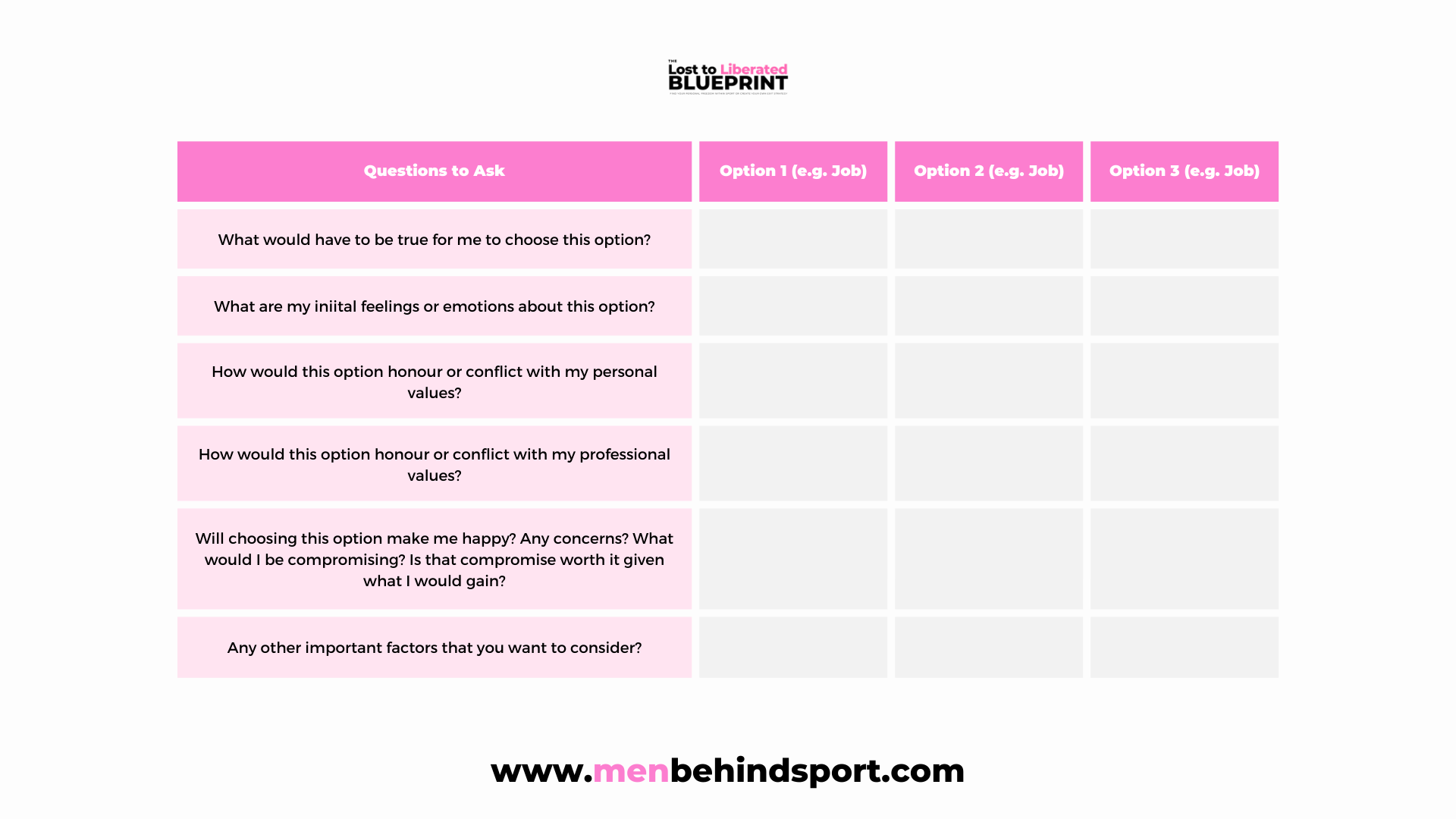
6 Powerful Steps to Make Values-Based Decisions As Performance Staff
Mar 30, 2023Without question, it takes a huge amount of vision, dedication, and skill to have gained the experience you have in high-performance sport.
Yet this devotion to vision, dedication, and skill creates a huge blind spot.
We fall into the trap of unconsciously filling our blind spots by seeking validation for our achievements.
It's nice to get recognition, financially or practically. However, without being clear on our values we end up going from job to job based on circumstances under the disguise of progress, hard work & external success (medals, level of athlete/team, seniority e.t.c.). Very often these parameters are based on what we think other people think is "good."
I'm not saying supporting athletes to championship success isn't success, as long as you are crystal clear with a clearly defined definition of success based on your own inner compass (values).
So the questions arise:
- Where are you heading with your progress?
- What does success mean and look like specifically to you?
- What does hard work mean and look like specifically to you?
In this article, you'll learn:
- How does getting clear on your values help
- How to get clear on your values
- How to make values-based decisions
How Does Getting Clear On Your Values Help
Values are the compass that allow you to choose the direction for your life that aligns with what is truly important to you. They help you construct goals that drive your actions in those directions. Whereas goals can be achieved, values cannot be achieved. Adaptive values contribute to your well-being while maladaptive values reduce your well-being.
For example, you might have the value of being a good parent which may require a lifetime's effort and the specific achievable goal of being present with your children by booking in time each day to be with them and turning off your devices. Or you might have the goal of helping an athlete return to play while placing value on doing your job to the best of your ability because you enjoy it and it motivates you to learn and grow.
Your values reflect what you find meaningful in life. They are what you care about, deep down, and what you consider to be important. Everybody’s values are different, and they can change over time. They reflect how you want to engage with the world, with the people around you, and with yourself.
Although values are by definition considered to be important (e.g. downtime, spending time with family/partner), our behaviour is often not consistent with our values (e.g., working during evening hours, sacrificing our personal life to maintain our role etc.). These factors often consist of patterns of behaving and thinking that negatively affect well-being, producing emotions like fear, anxiety and stress.
In order to decrease the discrepancy between values and actual valued living, it is important to create awareness of this discrepancy in the first place.
How To Get Clear On Your Values
These questions are aimed at helping you reflect on your personal life and career, identify top experiences, and identify what causes you unhappiness.
Personal Values
1) What are your top experiences?
How do you answer these questions:
- What brings me joy?
- What are some moments in my life that stand out as times when I felt happy and fulfilled?
- What values was I honouring in those instances?
My reflection: I know that I am happiest when I get to connect with people on a deep level, build relationships and support people in personal transformation. I also love being in nature with my family.
2) What are your suppressed values?
How do you answer these questions:
- When am I the most unhappy, resentful, frustrated, or stifled?
- What was going on?
- What values were not being fulfilled at these times?
My reflection: Whatever values were suppressed when I felt unhappy are likely my core values. I realized that I am unhappy and sometimes resentful when I feel I can't be my authentic self because of judgement from others. That helped me realize that “authenticity” is one of my core values.
3) What is your personal code of conduct?
How do you answer these questions:
- What is most important to me and in my life?
- What do I need to experience fulfilment? Love? Health? Wealth? Learning and growth?
My reflection: I wasn’t fulfilled in many of my S&C jobs because I was trying to do things that I thought other people wanted, rather than what I wanted. Only when I began to honestly question my drivers did I begin to find fulfilment in what I was doing.
The question was put to me: "Why do athletes like working with you?”
It wasn’t technical knowledge, many coaches have that. I thought it was because I’m a good coach.
Well, what does that mean?
That inquiry of just digging deeper under the surface away from the technical requirements allowed me to see why people come to me & what I’m good at. It was the connection that I made with people. Being clear on that helps me look at my choices through a lens to see whether I am being genuine and standing in my integrity of authenticity, or if I'm doing something to "look good.".
Professional Values
What are your “superpowers” or “zone of genius” — the types of work or behaviours that you feel the most in flow, confident, and happy with?
To get clear on work values, how do you answer these questions:
4) What are my intrinsic motivators for work and career?
Intrinsic values are what motivate us. They are often difficult to quantify but may deeply impact our sense of fulfilment. Some of my intrinsic motivators for work are:
- Making a positive impact on the culture of performance sport
- Getting to work with smart, passionate and authentic people
- Getting to express creativity in my daily work
5) What are extrinsic rewards that are important to me?
Extrinsic values are based on the tangible rewards we get from work, such as salary, benefits, and title. This get's sticky though, and is one of the major causes of unhappiness in the performance staff I support.
The badge on your chest, the achievements of "your" athletes, the recognition from your peers, the LinkedIn title, the boost to ego when you say what you do to people you meet.
Simply put these offer us "objective" external measures of success that our culture and society recognise as "important." I'm not saying they are bad, but I am saying that if these are the only measures you value then you're in for a rough ride leading to a sense of being unfulfilled.
Happiness is assumed will occur when these benchmarks of "success" are achieved. Yet it rarely does work out that way - for the men, I work with, nor did it for me in my career.
"I had a tough time after athletes I supported achieved Olympic success. I felt directionless and aimless, in my mind I thought that having an athlete winning gold was the pinnacle of what we do and why we do it - but after they had won I was waiting for some kind of feeling of achievement to hit and it just never did.”
6) How is my lifestyle impacted by my career choices?
To answer this you need to identify what you want your lifestyle to be like, and then think about whether your job/career helps you achieve that.
A previous job of mine provided opportunities for a very senior coaching role with amazing global travel, which did fulfil my core value of “adventure.” But it also meant that I would be away from my wife and daughter for weeks at a time, significantly conflicting with my core values of “relationships” and “connection.”
Ultimately, this was an easy decision to make because it was far more important for me to be able to spend quality time at home in Brighton, rather than travelling. I wanted to set my life up that would allow me to travel with my family. This was one of the major reasons I left coaching in Olympic sports, so I could honour that lifestyle preference.
How To Make Values-Based Decisions
The reason I started all the work and reflection to get clear on my values was that I hit a point in life where I recognized that my career in sport had run its course as I was not fully happy and fulfilled.
The hard part was that I wasn’t sure why. I was clear that part of my unhappiness was caused by work, as well as personal factors and I wanted to be able to think about making some changes.
After I got clear on my values, I wanted to create a way to use that awareness to make better decisions that would help ensure I feel happy, fulfilled, and thriving.
I made the table below to help myself think through a decision. By using this reflective process, I felt much more clear and confident in making a choice about what I want in my job and career.

By laying out my thoughts like this, I am able to make more mindful choices compared to the past. By focusing on how choices honour or conflict with my values, I get clear on how to make a decision that honours what I value most.
One of the biggest decisions all of this work has helped me make was to change my career at the age of 40 years old. I left a 16-year career as an S&C coach to build a brand new career that completely satisfies my core values and enables me to live a life full of freedom to make choices that I'm extremely excited about.
And this is it - men behind sport.
The work I do at men behind sport addresses very practical steps to allow male performance staff to understand themselves on a deeper level.
These practices help you accelerate your process of understanding yourself through inner work.
If you are interested in working with me you can learn more about The Lost to Liberated Blueprint and book a call here.
In Kindness,
Richard



